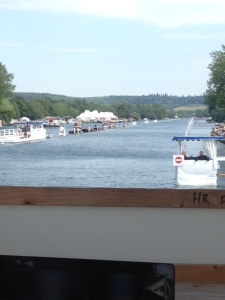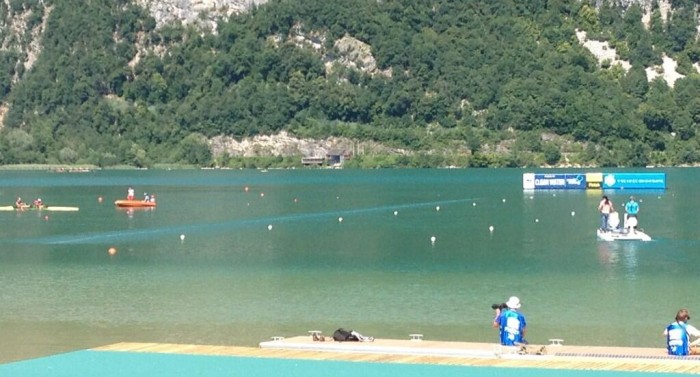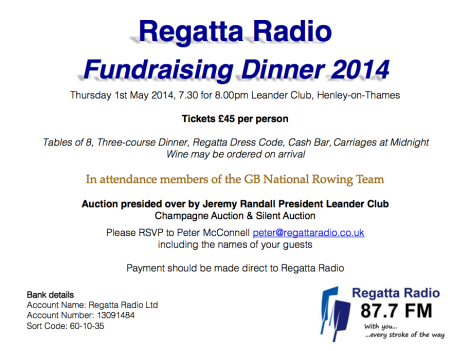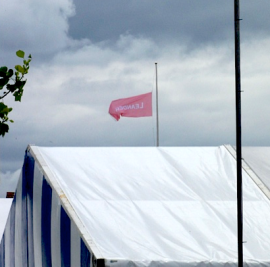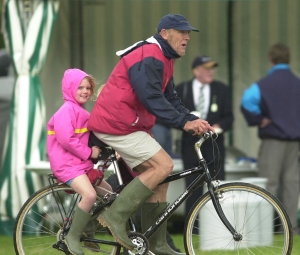Most of this one made it in, barring the last couple of sentences. Again not online.
History was made at Henley Royal Regatta yesterday when Dutch students Nereus obliterated the Temple Challenge Cup record, taking a staggering nine full seconds off it while beating Oxford Brookes University by a mere six feet in one of the regatta’s most competitive events. Rowing records usually fall by a second or two, but a combination of a light tail-wind and zero stream put both crews well inside the previous mark as they battled along the Enclosures, filmed by a drone camera capturing stunning footage of Friday’s races. No UK eights now survive in the Temple, after University of London lost to Cornell’s lightweights.
Five other crews set or broke records yesterday, including Nereus’ Prince Albert coxed four, and Sydney’s Visitors’ coxless four. South Africa’s reigning Olympic and world lightweight champions James Thompson and John Smith equalled a formerly heavyweight Barrier record for the Double Sculls, while Glasgow Academy rowed through to beat Sydney’s junior scullers in a course record for the Fawley Cup, taking one second off the time equalled a few hours before by Sir William Borlase.
The national minute’s silence was held at noon, when thousands of spectators stood to remember the victims of the Tunisian shootings. Single sculler Genevieve Bailhache-Graham was still trailing Olympic and Henley champion Mirka Knapkova as noon struck, and composedly sculled over the line in complete silence before bowing her head in her boat.
Princeton and Sport Imperial were forced to make last minute crew-changes as a result of injury, which in Imperial’s case turned into a nightmare situation. Lacking their usual substitutes, who are away in Germany, Imperial were forced to draft in Fred Vystavel, a full member currently studying in Princeton and racing in their Ladies Plate B crew, when their usual five-man Geordie Macleod woke up with back pain. However, a complaint was made that Vystavel as a junior varsity oarsman was ineligible to race in the lower-standard Thames event, a point upheld by the Stewards. Sport Imperial could not race, and the decision handed their opposition, the impressive University Barge Club from Philadelphia, a very easy day paddling over.
Princeton’s B-crew stroke man, former junior international Julian Goldman, had to race the 2112-metre course twice, the Princeton Ladies’ Plate ‘A’ crew stroke also out for medical reasons. Goldman’s B crew were flat out unsuccessfully trying to get on terms with Leander in the morning, before Goldman stroked the A-crew against undisputed US champions Washington six hours later. The Princeton Tigers manfully held the Huskies level to halfway, but could not quite match their power. A mishap was narrowly avoided when an umpire’s launch, which had accidentally entered the course while the crews were mid-race, backed rapidly off again in front of a full grandstand of spectators.
A different accident beset Düsseldorf’s Ladies’ Plate crew, who clipped the course-edge booms soon after the start, ending any chance of beating Yale’s varsity eight. “It wasn’t the cox’s fault, we were caught by a current,” said the stroke. “He usually steers very straight.”
The Princess Elizabeth schoolboy eights started to get interesting as Eton College lost by a length to Gonzaga High School, the Americans managing to match Eton’s pushes to stay ahead. That puts Gonzaga up against Westminster, who beat Andover by a similarly narrow margin, while St Paul’s and Radley race the other semi-final.
Today the British national eight is in action against Australia, an unknown quantity as they have not raced yet this season.
Rachel Quarrell.
